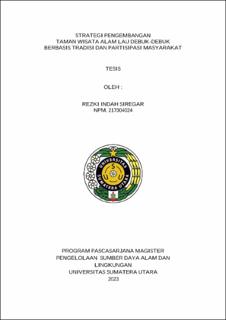| dc.description.abstract | The designation of the Lau Debuk Debuk forest area as a nature reserve based on the Radja Deli Decree dated September 30, 1934, underwent a functional change from a nature reserve to a tourist park. This change was authorized by the Minister of Agriculture Decree Number: 320/Kpts/Um/5/1980 dated May 9, 1980, regarding the Change of Nature Reserve Status covering approximately ±7 hectares located in the TK II Simalungun-Tanah Karo Region, TK I North Sumatra as a Forest Tourism, where hot sulfuric springs are present. This research aims to develop the Lau Debuk Debuk Natural Tourism Park (TWA) based on tradition and community participation. The study uses a qualitative approach involving local residents in the strategy development process. The research results include the identification of ecotourism potential in the Lau Debuk Debuk TWA, the introduction of local wisdom applicable to ecotourism management, and community participation steps in the development and management of ecotourism destinations. Data collection methods include interviews with expert respondents, field observations, and focus group discussions. The population in this study consists of stakeholders directly or indirectly related to the Lau Debuk Debuk Natural Tourism Park, such as government agencies, local community groups, surrounding communities, and visitors. Data analysis methods include the analysis of the natural tourist attraction area, the analytical hierarchy process processed using expert choice software, and Strengths, Weaknesses, Opportunities, Threats (SWOT) analysis. The research results indicate that the Lau Debuk Debuk TWA Conservation Area has the potential to be developed as ecotourism based on local wisdom and community participation, with an index of 82.2%. The primary priorities in developing ecotourism in the Lau Debuk Debuk TWA based on local wisdom and community participation are the Wisdom aspect, with the development strategy of collaborating with the community, improving facilities, and tourism management infrastructure. | en_US |


